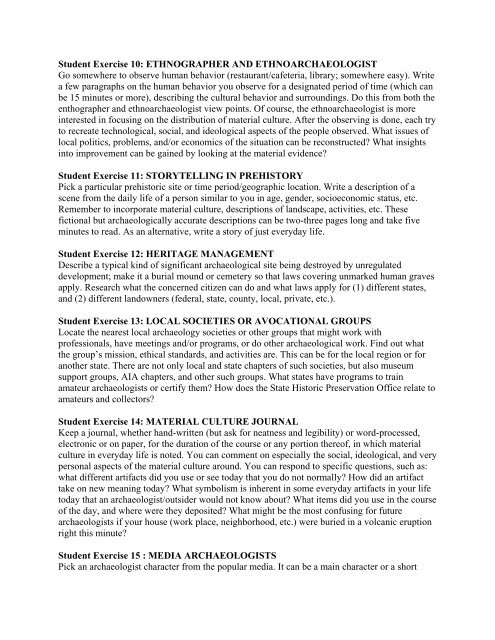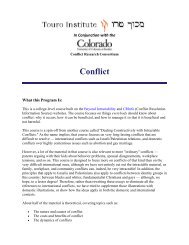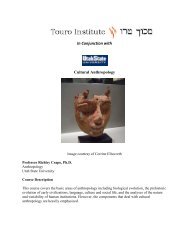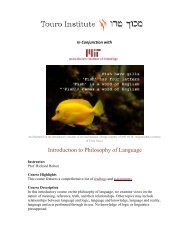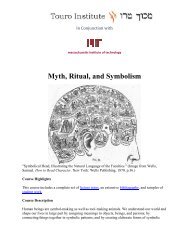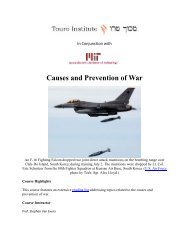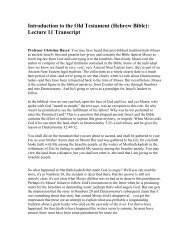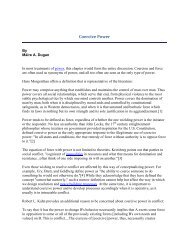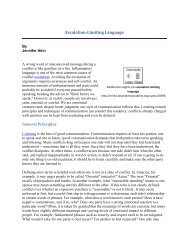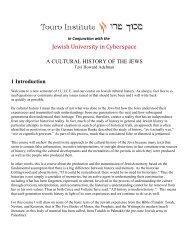INTRODUCTION TO ARCHAEOLOGY Nancy White - Touro Institute
INTRODUCTION TO ARCHAEOLOGY Nancy White - Touro Institute
INTRODUCTION TO ARCHAEOLOGY Nancy White - Touro Institute
Create successful ePaper yourself
Turn your PDF publications into a flip-book with our unique Google optimized e-Paper software.
Student Exercise 10: ETHNOGRAPHER AND ETHNOARCHAEOLOGIST<br />
Go somewhere to observe human behavior (restaurant/cafeteria, library; somewhere easy). Write<br />
a few paragraphs on the human behavior you observe for a designated period of time (which can<br />
be 15 minutes or more), describing the cultural behavior and surroundings. Do this from both the<br />
enthographer and ethnoarchaeologist view points. Of course, the ethnoarchaeologist is more<br />
interested in focusing on the distribution of material culture. After the observing is done, each try<br />
to recreate technological, social, and ideological aspects of the people observed. What issues of<br />
local politics, problems, and/or economics of the situation can be reconstructed? What insights<br />
into improvement can be gained by looking at the material evidence?<br />
Student Exercise 11: S<strong>TO</strong>RYTELLING IN PREHIS<strong>TO</strong>RY<br />
Pick a particular prehistoric site or time period/geographic location. Write a description of a<br />
scene from the daily life of a person similar to you in age, gender, socioeconomic status, etc.<br />
Remember to incorporate material culture, descriptions of landscape, activities, etc. These<br />
fictional but archaeologically accurate descriptions can be two-three pages long and take five<br />
minutes to read. As an alternative, write a story of just everyday life.<br />
Student Exercise 12: HERITAGE MANAGEMENT<br />
Describe a typical kind of significant archaeological site being destroyed by unregulated<br />
development; make it a burial mound or cemetery so that laws covering unmarked human graves<br />
apply. Research what the concerned citizen can do and what laws apply for (1) different states,<br />
and (2) different landowners (federal, state, county, local, private, etc.).<br />
Student Exercise 13: LOCAL SOCIETIES OR AVOCATIONAL GROUPS<br />
Locate the nearest local archaeology societies or other groups that might work with<br />
professionals, have meetings and/or programs, or do other archaeological work. Find out what<br />
the group’s mission, ethical standards, and activities are. This can be for the local region or for<br />
another state. There are not only local and state chapters of such societies, but also museum<br />
support groups, AIA chapters, and other such groups. What states have programs to train<br />
amateur archaeologists or certify them? How does the State Historic Preservation Office relate to<br />
amateurs and collectors?<br />
Student Exercise 14: MATERIAL CULTURE JOURNAL<br />
Keep a journal, whether hand-written (but ask for neatness and legibility) or word-processed,<br />
electronic or on paper, for the duration of the course or any portion thereof, in which material<br />
culture in everyday life is noted. You can comment on especially the social, ideological, and very<br />
personal aspects of the material culture around. You can respond to specific questions, such as:<br />
what different artifacts did you use or see today that you do not normally? How did an artifact<br />
take on new meaning today? What symbolism is inherent in some everyday artifacts in your life<br />
today that an archaeologist/outsider would not know about? What items did you use in the course<br />
of the day, and where were they deposited? What might be the most confusing for future<br />
archaeologists if your house (work place, neighborhood, etc.) were buried in a volcanic eruption<br />
right this minute?<br />
Student Exercise 15 : MEDIA ARCHAEOLOGISTS<br />
Pick an archaeologist character from the popular media. It can be a main character or a short


